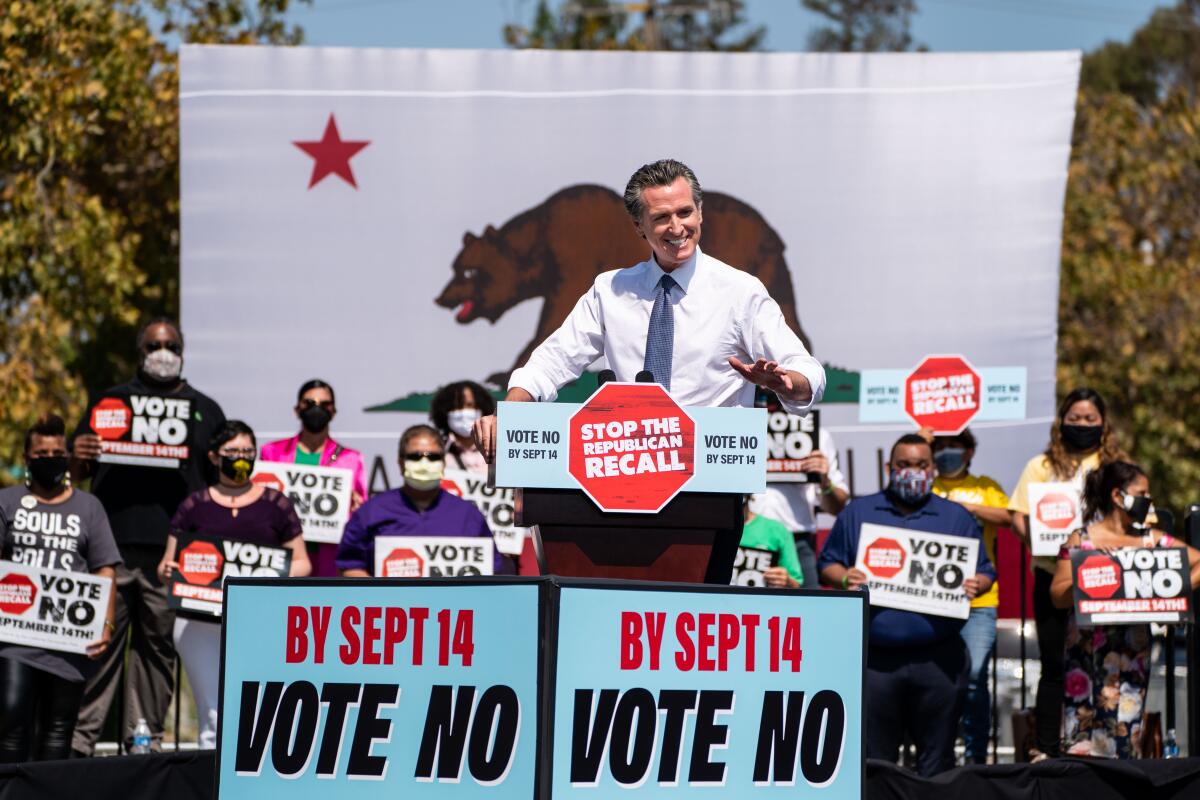Column: The American myth that’s driving some Latinos to support the recall

- Share via
Many of the voters of color who support recalling Gov. Gavin Newsom have one thing in common: They subscribe to the idea that hard work and self-discipline are really all it takes to win in this society.
Call it the pull-yourself-up-by-the-bootstraps ideology. It’s the magnetic, freedom-loving myth of the “self-made man,” with roots in Western cowboy masculinity — the twin of the Latino caballero’s machismo. In this pandemic, it has morphed into despising Newsom’s COVID-19 regulations as well as opposing state aid for people who’ve been thrown out of work.

Juan Rivera is a 21-year-old pro-Trump Latino resident from San Marcos who supports the recall. He says he voted for the YouTube personality Kevin Paffrath but isn’t bothered by the fact that a Republican is likely to become governor if the recall succeeds. “People don’t want to work, because the government keeps giving them money,” Rivera told me. “It’s ridiculous.”
The belief in “el sueño Americano,” which sees this country as a land of opportunity, predisposes some Latinos to dismiss the poor or unemployed as lazy — lacking “ganas.” This view obscures how history and government determine outcomes, including access to basic resources such as clean water, healthcare and roads. Blind faith in individualism, which promotes antipathy for institutions, can lead some Latinos to sit out elections or vote against their interests.
A recent Pew Research Center study found that Latinos are “more likely than the general U.S. public to believe in core parts of the American dream — that hard work will pay off and that each successive generation is better off than the one before it.” Latinos are also more optimistic about their future than average Americans, with 75% expecting their standard of living to be better than that of their parents, compared with only 56% of those in the general U.S. public.
Notably, the study also found that optimism declines from one generation to the next as immigrants’ kids and grandkids find themselves living a different reality.
“Hard work is necessary, but it’s not a sufficient condition for being able to experience success,” Isidro Ortiz, a political scientist and professor of Chicano activism at San Diego State, told me. “You need opportunity as well, so that hard work can actually translate into economic success. And that’s where the government comes into play.”
The recall election’s Republican front-runner, Larry Elder — who blames the problems of Black people on Black people and denies the reality of systemic racism — has won support because he offers up this simple mantra: “Hard work wins.”
Elder’s appeal to a minority of Black and brown Californians with this message doesn’t surprise Jasmine Hill, an assistant professor of public policy and sociology at UCLA. “It’s a very alluring narrative, because it says that if I just keep working hard, this will work out for me,” she told me. Fundamentally, it assumes that poverty and deprivation are personal choices.
Hill’s research, like that of other sociologists, finds that this politicized view defies the reality that people of color work hard. Black and Latino Americans are more likely to have essential jobs — including in warehouses, trucking and construction — requiring grueling work outside the home, often without access to paid sick leave. Nevertheless, they continue to make lower wages than white workers.
Worse, this fallacious concept that the downtrodden have earned their lot inspires bad policies that aggravate social problems and reinforce racist stereotypes. “It’s extremely bad for the social fabric, particularly our relationship to people of color,” Hill said.
Democrats, as much as Republicans, have fashioned policies that reinforced these falsehoods. Bill Clinton’s 1996 welfare reform choked off help for poor families, accepting as true the Reagan-era racist attacks on the immorality of Black mothers and their families. And while most Black and brown people believe that forces such as institutional racism and historic discrimination contribute to inequality, that understanding has declined over time.
It’s not surprising that many people of color who support the recall effort favor what Republicans like Elder call “school choice” — specifically, giving taxpayer- financed vouchers to parents rather than investing in public schools.
“We want choice for our kids because we want our children to be brought up correctly,” Eddy Marmolejo, state chairman of the Republican National Hispanic Assembly, told me. “The parent has to decide what’s best for the child.” Support for this policy also stems from the myopic belief in the supremacy of the individual, even at the expense of the society’s most vulnerable children.
Of course, Republicans whose worldview would preserve existing inequalities recognize that they can no longer win elections without some support from people of color, particularly as demographics change.
So, they’re ramping up rhetoric about the self-made man, which they hope makes a connection with hardworking immigrants. “Innovation and hard work should be celebrated,” Republican candidate Kevin Faulconer recently tweeted. “Instead, Californians and their businesses have suffered under never ending regulations.”
In an essay titled “The Ideology of Isolation,” the writer Rebecca Solnit points out the dangers of the myth of complete self-reliance: “Taken to its conclusion, this worldview dictates that even facts are freestanding items that the self-made man can manufacture for use as he sees fit.”
Perhaps the best way to break the spell of this destructive narrative is to tell real stories of how lives improve. Ortiz explains that for Black and brown communities, progress is always born of community struggle. “All the civil rights advances that have occurred, those all came out of collective action emphasizing cooperation,” he said. Falling for the story of rugged individualism robs us of our power. That’s what it’s meant to do.
More to Read
A cure for the common opinion
Get thought-provoking perspectives with our weekly newsletter.
You may occasionally receive promotional content from the Los Angeles Times.









